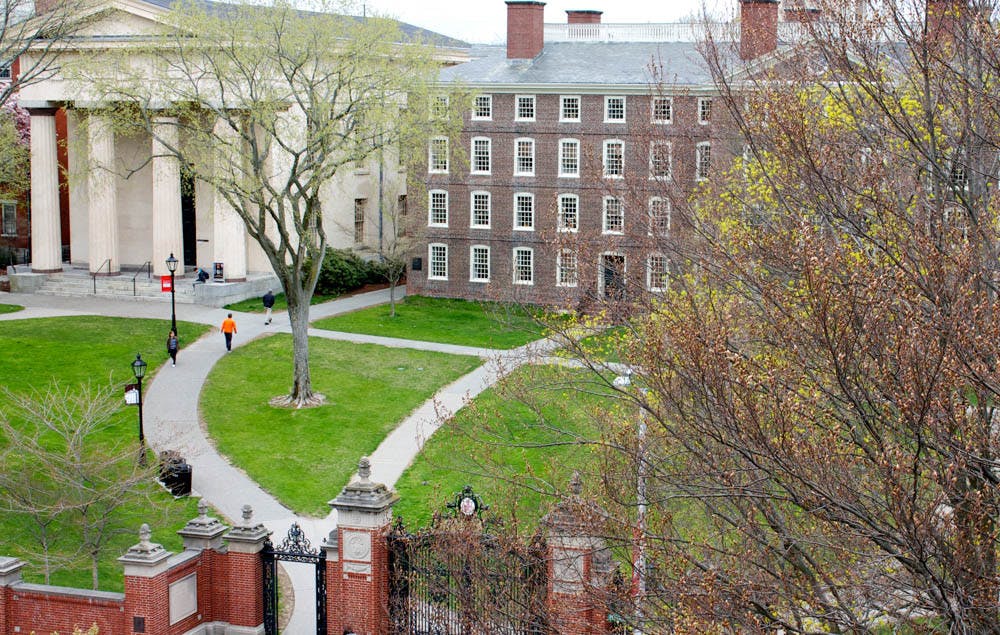The University has begun redirecting donations from the Sackler family’s organization, La Fondation Sackler, to Rhode Island charities that support treatment for opioid addiction.
Brown’s senior leadership decided to redirect over $1 million in gifts from the foundation over concerns about the “extensive demonstrable harm” caused by Purdue Pharma, the pharmaceutical company that has been controlled by the Sackler family for generations, Vice President for Communications Cass Cliatt wrote in an email to The Herald. The move marks the first time in the University’s recent history that it has redirected a charitable donation.
The Sackler family has come under fire for Purdue Pharma’s role in the opioid crisis. The company recently filed for bankruptcy after being sued by various state and local governments.
The Sacklers are also known for their donations to cultural and academic institutions, such as a handful of Ivy League universities and the Metropolitan Museum of Art. On Wednesday, Yale announced that it would no longer accept Sackler donations, though its Sackler Institute will remain, the Yale Daily News reported.
La Fondation Sackler donated over $1 million to the University in 2015 to endow a series of arts events. The Corporation, the University’s highest governing body, approved the gift in February 2016. But as University leadership discussed how to structure the arts series, Purdue Pharma and the Sackler family received increased scrutiny for the effects of the company’s signature opioid, OxyContin, and the family’s contributions to a system that created a deadly crisis. The University decided to hold off on spending the donation between late 2017 and early 2018 due to the controversy.
“Some executives at Purdue Pharma pleaded guilty to having engaged in deceptive marketing practices, and attorneys general in dozens of states have alleged that these practices contributed to a major, widespread health epidemic," Cliatt wrote.
Members of the University’s senior leadership began discussions about the gift with La Fondation Sackler several months ago. The University intends to redirect the major gift to Rhode Island organizations that provide medicine-assisted treatment for opioid use disorders and related research, Cliatt wrote. The terms of the major gift’s agreement require that the foundation agree with the University on the decision to redirect the funds, as well as the organizations to which the funds will be redirected, she added. The University is currently working with La Fondation Sackler toward redirecting this gift. Once they reach an agreement, the Corporation will be asked to vote on the redirection of the gift.
The Sackler family donated $100,000 to Brown’s Annual Fund, which supports general University operations. The University has already redirected that gift to CODAC Behavioral Healthcare, a Rhode Island-based nonprofit organization that provides outpatient treatment for opioid use disorder, Cliatt wrote. “CODAC is highly regarded for the quality and reach of its work, including its innovative treatment programs at Rhode Island adult correctional institutions,” she added.
Brown’s decision about the Sackler donations comes as universities face pressure to reexamine from whom they accept donations and why. The University currently faces pressure from students and faculty to cut ties with Warren Kanders ’79 P’23, a member of the advisory council for the Institute at Brown for Environment and Society, The Herald previously reported. Kanders stepped down as vice chairman of the Whitney Museum of American Art in July over protests about his company’s manufacture and sale of tear gas. The University appears to stand by its decision to have Kanders on IBES — Director of News and Editorial Development Brian Clark declined to comment on Kanders’ resignation from the Whitney and his position at the University, previously telling The Herald that the news was “not specific to Brown.”
“When accepting a gift, the Brown administration and the Corporation exercise judgment about whether a gift is aligned with Brown’s mission of education and research, and whether association with a donor will harm the integrity of the institution,” Cliatt wrote. “Concerns about Warren Kanders reflect a larger policy issue — whether tear gas should be approved for use by law enforcement — rather than a specific concern about how Kanders’ company conducts business.”
The University has no remaining gifts or proposals from the Sackler foundation, according to Cliatt. “There are no plans to receive gifts in the foreseeable future. Brown has no programs, initiatives or buildings bearing the Sackler name,” she wrote.
Neither La Fondation Sackler nor a representative for the Sackler family could be reached for comment by press time.
Correction: A quote provided by Vice President for Communications Cass Cliatt in the original version of this article misstated the parties who engaged in deceptive marketing practices, and omitted the source of the allegations that these practices contributed to a major, widespread health epidemic. Cliatt provided an updated statement that is now in the article. The article also mistakenly stated that La Fondation Sackler donated $100,000 to Brown's Annual Fund when it was, in fact, a gift from the Sackler family. The Herald regrets the errors.





